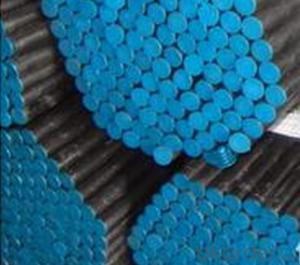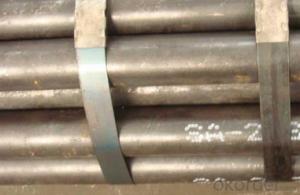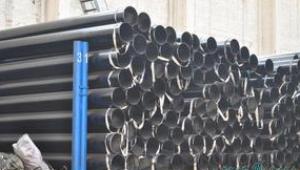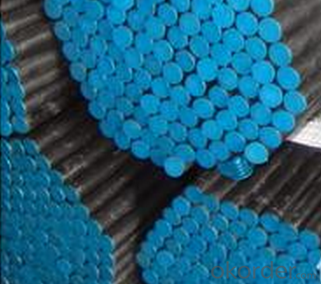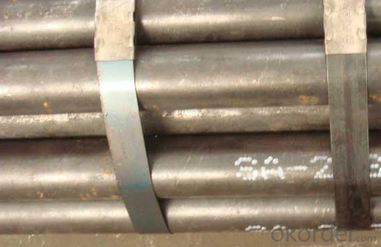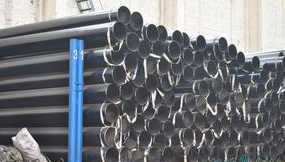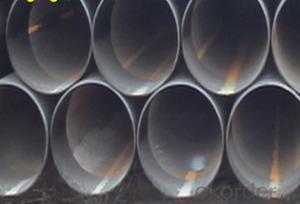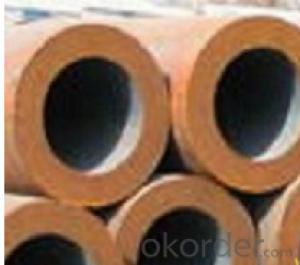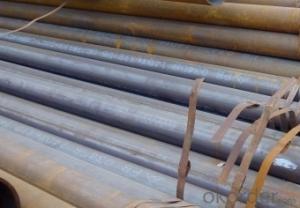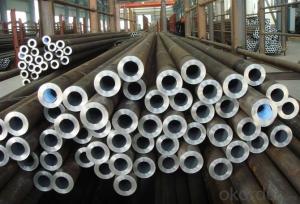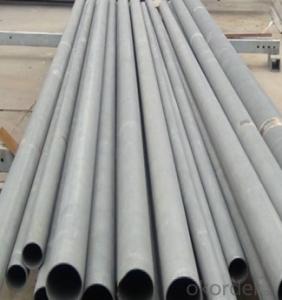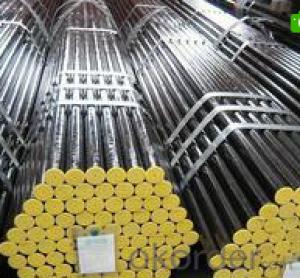Schedule 40 ASTM A53 API 5L GR.B Carbon Seamless Steel Tubes 10# CNBM
- Loading Port:
- Qingdao
- Payment Terms:
- TT OR LC
- Min Order Qty:
- 10 pc
- Supply Capability:
- 30 pc/month
OKorder Service Pledge
OKorder Financial Service
You Might Also Like
Quick Details
| Thickness: | 2.0 - 85 mm | Section Shape: | Round | Outer Diameter: | 17 - 914.4 mm |
| Secondary Or Not: | Non-secondary | Application: | Oil Pipe | ||
| Technique: | Hot Rolled | Certification: | API | Surface Treatment: | VARNISH PAITING |
| Special Pipe: | API Pipe | Alloy Or Not: | Non-alloy | END: | PLAIN,BEVELED OR THREADED |
| Grade: | 10#,20#,16Mn,A106(B,C),A210,A335 P5,A335 P91,A53(A,B),API J55,API K55,Q195,Q235,Q345,St37,St52,10#-45#,A53-A369,API J55-API P110,Q195-Q345,ST35-ST52 | Standard: | API 5CT,API 5L,ASME B36.19M-2004,ASTM A106-2006,ASTM A179-1990,ASTM A182-2001,ASTM A53-2007,BS 1387,DIN 1629/3,DIN EN 10216-1-2004,GB 5310-1995,GB/T 3091-2001,GB/T 8162-1999,GB/T 8163-1999,JIS G3454-2007,API,ASTM,BS,DIN,GB,JIS |
Packaging & Delivery
| Packaging Detail: | standard packing suitable shipping by sea.fixed length as customers' requirements, or SRL or DRL. Varnish, painting or galvanized, or FBE ,2PE,3PE 3pp coating,bevelled/plain/threaded ends with caps, packing in bundle (OD smaller than 141.3mm) big sizes packing in loose, marking as required. Shipped by sea,by air,by train . or some samples shipped by DHL,EMS,TNT,FEDEX ect. Length shorter than 5.85m should be shipped by 20' container, 5.85-12m shipped by 40' container. |
| Delivery Detail: | 7-35 days after advance payment |
Product Description
Seamless steel pipes, a large number of used pipes conveying fluids, such as transport oil, natural gas, gas, water pipes and some solid materials, and so on. Compared to other steel and solid steel bar, the same torsional strength in bending, lighter, is an economic cross-section steel, widely used in the manufacture of structural parts and mechanical parts, such as drill pipe, automotive drive shafts, bicycle rack and construction using steel scaffolding ring with steel pipe manufacturing parts, can improve material utilization, simplify the manufacturing process, saving material and machining time, such as bearing rings, jack sets, has been widely used to manufacture steel. Steel or a variety of conventional weapons indispensable material, gun barrels to make steel. Steel shapes in different cross-sectional area can be divided into tube and shaped tubes. As in the perimeter of equal conditions, the largest area of a circle with a circular tube can carry more fluid. In addition, the circular cross section to withstand internal or external radial pressure, the force is uniform, so the vast majority of the pipe is pipe.
- Q: What is the difference between carbon steel pipes and stainless steel pipes?
- The main difference between carbon steel pipes and stainless steel pipes lies in their composition. Carbon steel pipes are primarily made of iron and carbon, while stainless steel pipes contain iron, carbon, and a minimum of 10.5% chromium. This chromium content in stainless steel pipes creates a protective layer of chromium oxide on the surface, making them highly resistant to corrosion. On the other hand, carbon steel pipes are more susceptible to corrosion and require additional coatings or treatments to prevent rusting. Additionally, stainless steel pipes offer better heat resistance and can withstand higher temperatures compared to carbon steel pipes.
- Q: DN80 seamless steel tube, what is the standard thickness?
- Generally speaking, the diameter of the pipe can be divided into outer diameter, inner diameter and nominal diameter. Tubes are made of seamless steel tubes. The outer diameter of the tubes is indicated by the letter D, followed by additional outer diameter dimensions and wall thicknesses such as seamless steel tubes with an outer diameter of 108.
- Q: Can steel pipes be galvanized?
- Indeed, it is possible to galvanize steel pipes. Galvanization involves the application of a safeguarding zinc layer to steel or iron in order to hinder corrosion. The steel pipes are immersed in a solution of molten zinc, resulting in a chemical union between the zinc and steel that produces a protective coating resistant to corrosion. Galvanization finds widespread use across multiple fields, including plumbing, construction, and outdoor structures, primarily to prolong the durability of steel pipes and inhibit rust formation.
- Q: What is the elasticity of steel pipes?
- The elasticity of steel pipes refers to their ability to deform under stress and then return to their original shape once the stress is removed. Steel pipes are known for their high elasticity, which allows them to withstand heavy loads and pressure without permanent deformation.
- Q: What are the specific differences between flexible pipes and rigid pipes?
- The rigid waterproof sleeve is used in the wall of the building which does not need to bear the vibration and expansion deformation of the pipe, and the wall thickness is 200mm in general;Flexible waterproof sleeve is mainly applicable to the wall of buildings with seismic requirements, pipeline vibration and expansion deformation, and strict waterproof requirements, and the wall thickness is 300mm
- Q: What is the single length of galvanized steel pipe?
- The single length of galvanized pipe is 6 meters. The length of galvanized seamless steel tube is uncertain. It depends on the length of seamless steel tube
- Q: Can steel pipes be used in extreme weather conditions?
- Yes, steel pipes can be used in extreme weather conditions. Steel is a durable and strong material that can withstand various weather conditions, including extreme temperatures, high humidity, and severe storms. Additionally, steel pipes can be coated or treated to provide additional resistance against corrosion, making them suitable for use in harsh environments.
- Q: Are steel pipes resistant to impact?
- Yes, steel pipes are generally resistant to impact due to their strong and durable nature. They can withstand heavy loads and external forces, making them suitable for applications that involve high-pressure environments or potential impact scenarios.
- Q: How are steel pipes insulated against heat loss?
- Steel pipes are commonly insulated against heat loss by applying a layer of thermal insulation material around the pipes. This insulation material can be in the form of foam, mineral wool, or fiberglass. The insulation is typically wrapped tightly around the pipes and secured with adhesive or tape to ensure proper coverage. This insulation layer helps to reduce heat transfer through the pipe walls, thereby minimizing heat loss. Additionally, the insulation may be covered with a protective jacket or coating to provide further protection against external elements.
- Q: What is the outer diameter and wall thickness of DN40 steel pipe?
- DN40, refers to the diameter of 40mm, that is, an inch and a half, there are welded pipe and galvanized pipe,Ordinary wall thickness 3.5mm wt 3.84kg/mThicken 4.25mm weight 4.58kg/m
Send your message to us
Schedule 40 ASTM A53 API 5L GR.B Carbon Seamless Steel Tubes 10# CNBM
- Loading Port:
- Qingdao
- Payment Terms:
- TT OR LC
- Min Order Qty:
- 10 pc
- Supply Capability:
- 30 pc/month
OKorder Service Pledge
OKorder Financial Service
Similar products
Hot products
Hot Searches
Related keywords
